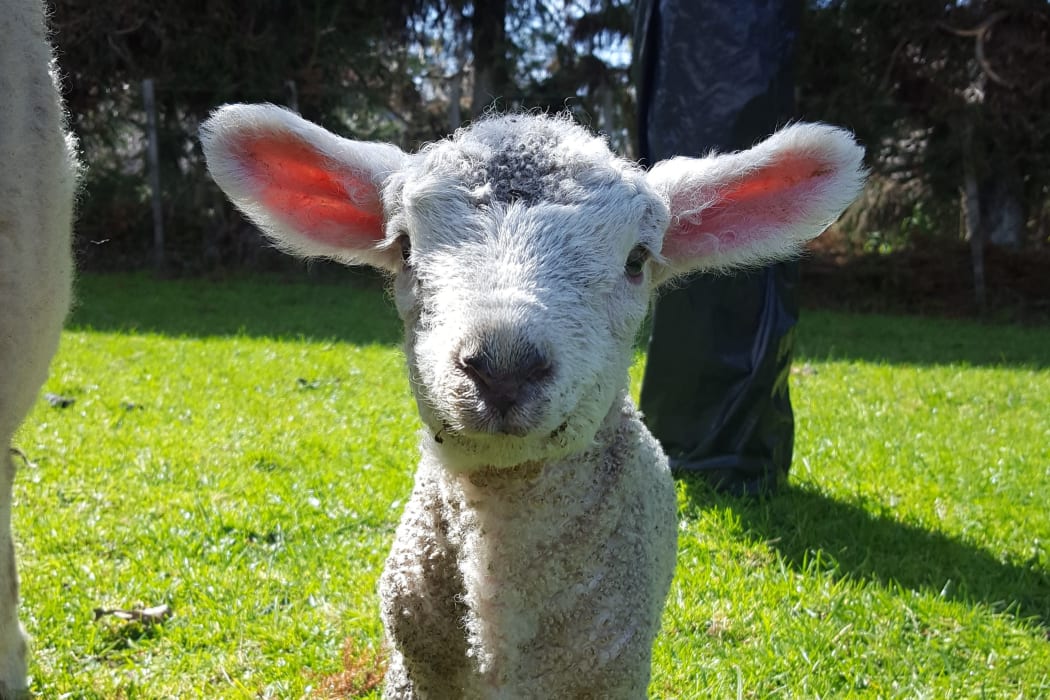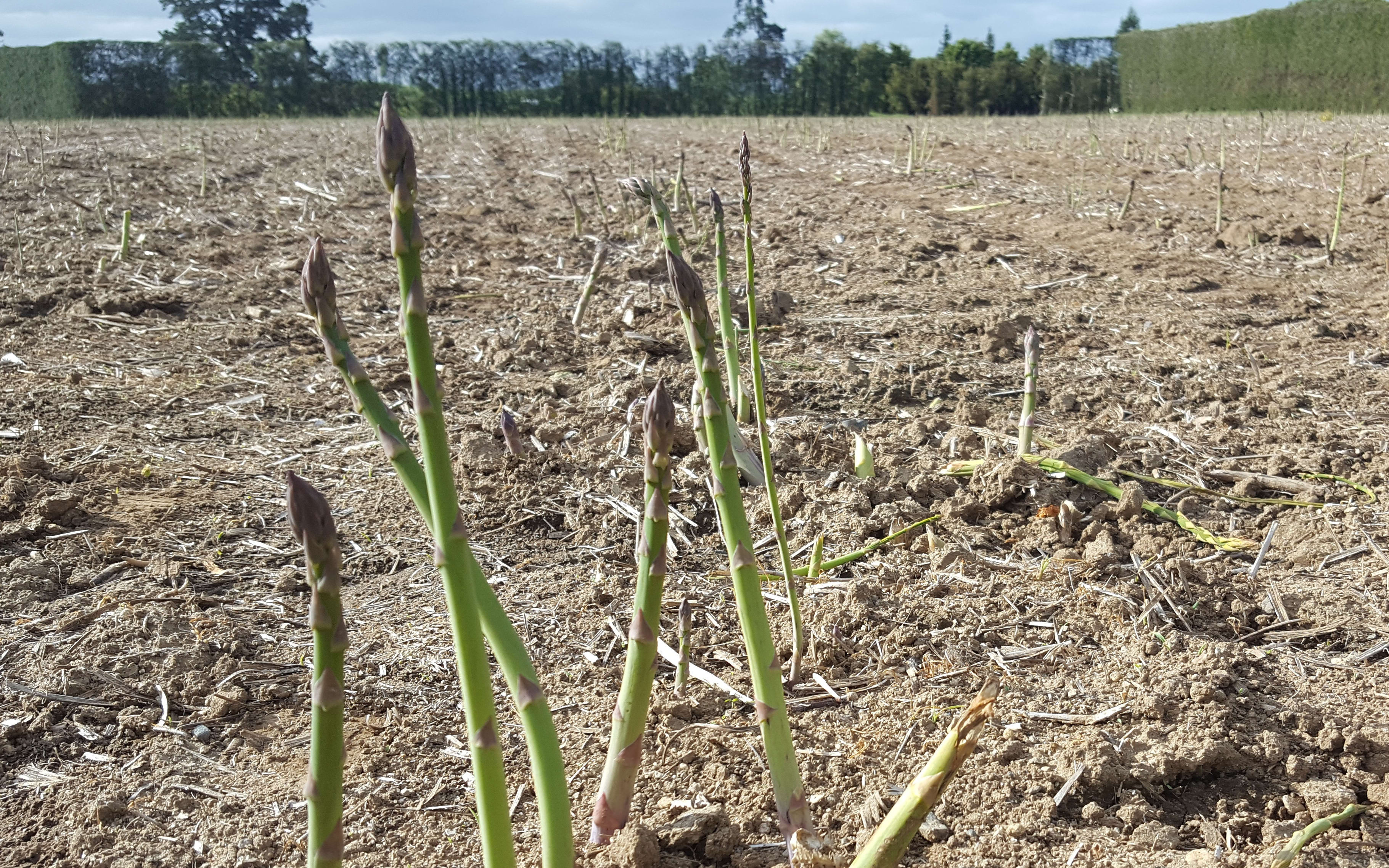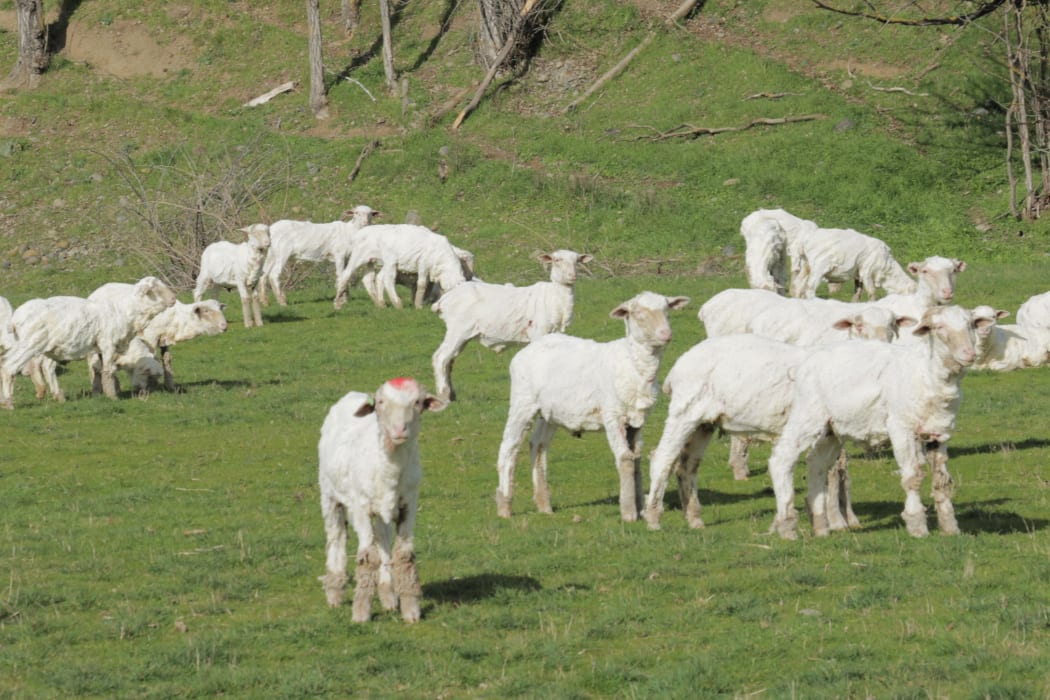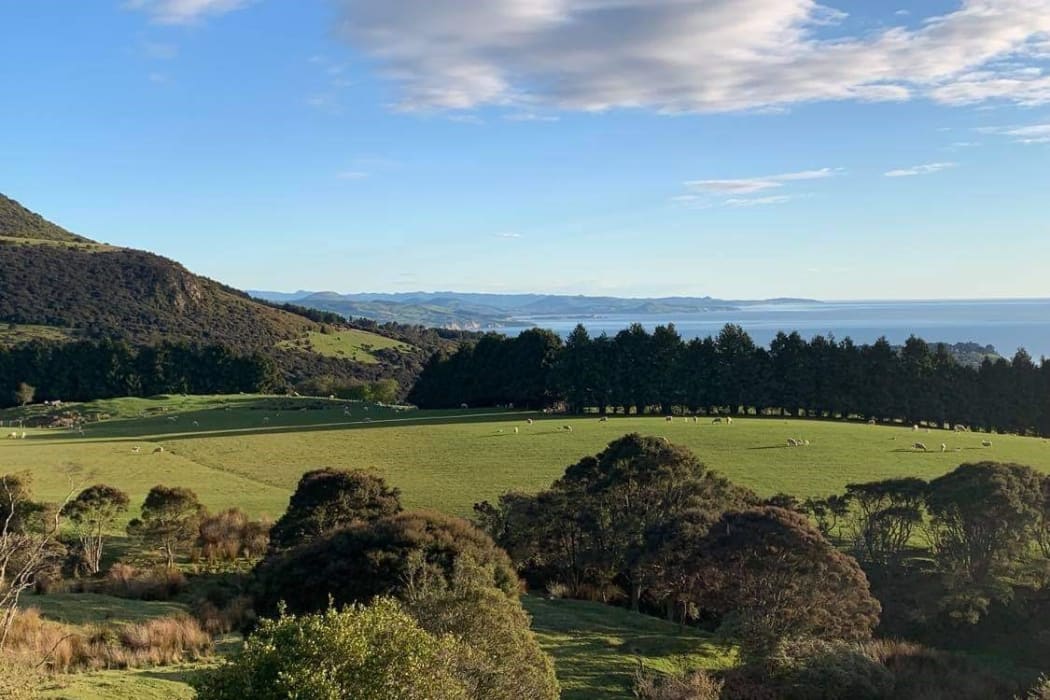
Photo: RNZ / Susan Murray
In Horowhenua a wet and cold period this week has slowed up asparagus production this week. Good weather in Canterbury has allowed for a range of tasks to be completed including spraying, drilling, dagging lambs and drenching cattle. On the Farm is a round up of conditions on farms and orchards around the country.
Around Pukekohe it's been dry at times and a little wet at others. Kiwifruit have had a rough time with gusty winds causing injury to the soft young leaves. Orchardists are being advised to look out for PSA disease and maintain spray programmes. Birds are also causing problems and "Bird Bangers" will be needed for a few more days. Their use has angered some residents nearby.
In Waikato, it's been cold. Farmers are just hanging in there waiting for spring to burst. They need temperatures to warm up as growth has stalled and the lambs need some sun on their backs. Soil moisture is fine and feed levels are OK. Farmers in colder environments are still lambing and others are in docking mode.
It's been a lovely sunny week in Bay of Plenty. The grass is really growing and a lot of farmers are starting to get summer crops in the ground and preparing for maize planting. They're also busy feeding calves and getting ready for mating. Our contact says some are exploring options around the use of sexed semen - trying to be proactive around reducing the number of bobby calves born. He says frost fans have been whirring during the week in neighbouring orchards.
King Country started the week damp and ended on a sunny note. Here, too, spring is struggling to arrive with gusto and with it the surplus of feed that the warmer weather brings but we're told farmers aren't in panic mode. Lambs are everywhere and docking is keeping farmers busy.

Mt Taranaki Photo:
Heavy rain and a cold southerly blast bringing a drop of snow to the maunga chilled things down in Taranaki after a warm start to the week. Winter has had a long tail to it and grass growth is sluggish. Feed has become quite tight and milk production is down because of the lack of sunshine hours but a couple of our contacts have had significant birthdays - with shindigs to match - to keep spirits up!
Grass is pulling away beautifully on farms near Wairoa in Tāranga-nui-a-Kiwa . But a farmer says he's a month behind putting crops in the ground because it's been so wet. He was in his tractor heading out to spray the weeds which have got a headstart. When it does dry out he'll be putting in hybrid Italian rye grass and red clover - a change from the maize he's grown for the past eight years. The costs of putting in that crop have risenly significantly compared to the payment received.
Things are tracking nicely on Hawke's Bay orchards. There've been a couple of frosts this week and a bit of rain. Orchardists have been spraying to make sure the fruit is nice and clean. They're analysing the trees to make sure they have the right crop loads and to get a better understanding of their labour needs this season. Stone fruit is just nearing the end of flowering and apples are just starting. A hort consultant tells us because productions costs have gone up so much, growers have been changing to the higher coloured apple varieties. He says it's what the market wants ... because people eat with their eyes.
In Horowhenua a wet and cold period this week has slowed up asparagus production. A grower says daily production is down a quarter. This time last year four tonnes a day were being produced but this year that's dropped to a tonne a day. Other greens have also suffered from the lack of warmth. He's optimistic things will warm up soon as they gear up for strawberry production. He is well set for labour with a team of RSE workers who are in between grape pruning and apple thinning.

Photo: RNZ/Susan Murray
Wairarapa has had a mixed bag of spring weather this week - wet, cold, a bit of warmth and a couple of frosts for good measure which set fans whirring in vineyards. An arable farmer is waiting for more warmth and sunshine to dry things out before she can start direct drilling her crops. She's hoping to plant more durum wheat this year after amazing feedback from pasta manufacturers, restaurants and cafes. In the meantime she's putting in irrigation to prepare for climate change.
Apple pruning's still going in the Nelson region. It's taking longer than usual due to a lack of staff. Bees are out in early variety Braeburn and Envy blocks and the bloom on trees is excellent - so there's the potential for a good crop. Early season spraying's underway but there's a shortage of spray products due to hold-ups at ports. Pruning's finished on the gold and Hayward kiwifruit and the young shoots are out. Many fruit growers are struggling to get hail insurance which is a concern given that hail wiped out crops last season.
A Marlborough grape grower at Renwick says they've had a typical mixed bag of spring weather this week. There've been some warm days, sprinkles of rain and also frosts, so the tow and blow machine was needed on a couple of nights. It's a mobile, diesel powered frost fighter that protects up to seven hectares of vines. Because it's an organic vineyard, the main job at the moment is mechanical under-vine weeding. The grower's also getting the canopy sprayer ready now that bud burst's happened.
A good dose of sun's needed in South Westland. Dairy farmers are getting down to the last of their baleage reserves as grass growth's been non-existent. Some are having to buy in more supplements. A farmer at Fox Glacier says seven percent of his herd is still to calve but milk production's way down due to a lack of quality feed.

Photo: RNZ / Cosmo Kentish-Barnes
A good week of weather in Canterbury has allowed for a range of tasks to be completed this week, including spraying, cultivation, drilling, rolling grass seed, dagging lambs, weighing and drenching cattle. On top of the usual spring mayhem many farmers are beginning to put their farms back together after recent wind damage. For some it will take years and many more to re-establish the lost shelter trees.
Our contact in Otago's Taieri district says it's been windy and showery, but the ground's been firm enough to sow grass seed onto paddocks. Pasture levels are okay but only just, so cows are getting a good top up of baleage. He has two cows left to calve out of a herd of 125 pedigree Friesians. Cows that have calved are getting checked for uterine infections in preparation for artificial insemination - due to start in three weeks.

Otago Photo: Michael Godfrey
A farmer in Southland's Blackmount Valley says ewe lambing's about 80 percent through. He's not sure about survival rates though as he leaves them to it on the hills - but he thinks they'll be good. Hoggets have been vaccinated and drenched and spread out for lambing. On Monday the farmer sent the last of his winter lambs to the works. He's getting 190 dollars for a 21 kilogramme animal, the best price he's ever had for works lambs. Yearling calves are coming off winter crops - but the ground's too wet to get tractors in to paddocks to prepare the ground for pasture and crops.

